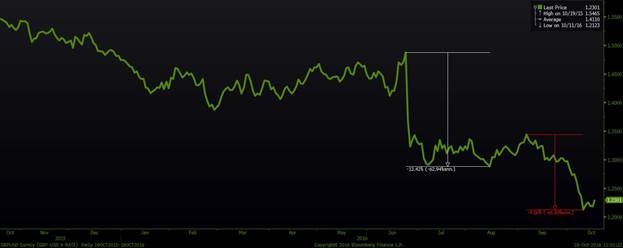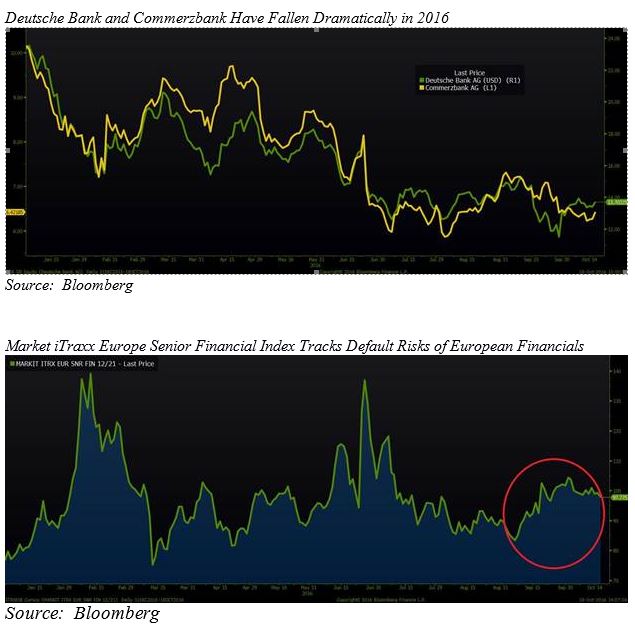Global economic growth is boringly slow, but it is still growth. Pessimists point out that the last few years have been the slowest economic recovery in seven decades, and that the average household in the U.S. has less income after inflation than in 2006. Optimists point out that positive change is afoot in many countries.
Recently, new governments in Brazil and Argentina have made moves to better their economic circumstances with more economically rational policies. This trend may continue worldwide in coming months. We see world markets as changeable, and we are closely monitoring those changes for opportunity.
The most important investment trend that we see, and that we believe we will continue to see, is an increase in inflation in many countries.
This inflation will first develop in those countries that have encouraged their currencies to fall, versus their trading partners’ during the current polite, but real, war of devaluation.
We say “polite” because the devaluations that are going on are gradual, unless a crisis develops. Gradual devaluations have historically worked, and will work again this time. Their purpose is to allow the country to export more and discourage imports. A lower currency makes foreign goods more expensive and generates more exports. Among the gradual devaluing nations are China, Europe, the UK, and much of Latin America and southeast Asia.
Countries such as the U.S. which have allowed their currencies to rise will see a slower inflation increase, but the inflation trend will also be up in the U.S. Higher inflation will spark demand for assets that can hedge against inflation. These include gold, oil, other precious metals, natural gas, and growth stocks that can grow more rapidly than inflation. We remain bullish on all of these inflation-benefitting sectors.
Stocks
The U.S. market is slightly positive -- focus on three sectors mentioned below. The key to the U.S. market is the price of the U.S. dollar. If the dollar rises too much from its current level, U.S. exports will be hurt and U.S. corporate profits will suffer. Watch the DXY U.S. dollar index.
Sectors
1. Beneficiaries of inflation: gold, natural gas, oil and commodity-related.
2. Technology with a productivity advantage -- major tech growth stocks.
3. Old-line technology for access to e-commerce and the cloud, which could provide revived growth for older tech companies.
Emerging Markets Remain Attractive
Look especially at those which have strong demographic trends, or are turning from corruption toward reasonable governance: India, Brazil, Argentina. Look for commodity plays, especially oil and gold, in these countries.
Europe
There are a few good areas in Europe -- for example, Norway (oil producer with big sovereign wealth fund), and UK (export beneficiary of a lower pound if you hedge the currency).
Currencies
Longer term, we believe pound sterling is an attractive short sale. We are watching several other currencies as potential short-sale candidates. Stay tuned.
Commodities
Precious metals: we are bullish on gold and silver both technically and fundamentally for a few months; we are also bullish on oil for a few months. We are carefully watching the grains for a bottom which may be developing.
Economics
We anticipate that many nations will add some fiscal policy in the form of tax cuts or infrastructure spending to their policy activity in the next year or two. Monetary policy seems to have reached its limits of effectiveness, and fiscal policy can stimulate economic growth -- especially if combined with tax cuts or possibly if combined with effective infrastructure investment.
We believe that the world economy will experience another recession beginning in Europe in the next few years. We are prepared for that, and we do not see it as quite as bad for the U.S. as the recession of 2007–2009. We expect it to originate outside of the U.S., and the U.S. will be partly protected by our better-capitalized banking system.
Worries Drive Exodus From European Bond and Stock Funds
Pound Sterling: Two Legs Down
Source: Bloomberg
Renewed worries about the political and economic fallout from Brexit have recently shaken markets again. Without having recovered much from the lows registered in the Brexit vote’s immediate aftermath, the pound sterling recently dropped further, as Conservative Prime Minister Theresa May broached the actual implementation of the exit process and European officials talked tough about negotiations with the UK.
The at-times chaotic decline in sterling underlined a trend that has been in place all year, and has recently accelerated: outflows of funds from European stock and bond funds. In the week ending October 12, bond fund redemptions were $2.2 billion -- the largest since June, 2015, reversing gains that had come in the wake of post-Brexit stimulus pledges. Year-to-date redemptions from European equity funds edged close to $100 billion.
Brexit fears were one reason, but several other worries are contributing to the flight from European funds:
• Investors are concerned that although the timing is unknown, Europe’s extraordinarily low interest rates must eventually begin to rise -- particularly if negative rates turn out to be ineffective at sparking growth and could be setting up risks for future financial instability. The baseline expectation is still for easing from the European Central Bank, but concern is in the air.
• Europe’s banking system remains a trouble spot. Deutsche Bank (NYSE:DB), already down nearly 40% on the year, experienced another selloff in the wake of penalties imposed by the U.S. Department of Justice for alleged misconduct during the financial crisis. A cloud hangs over other banks and national banking systems in the Eurozone because of the inadequacy of post-crisis recapitalization, and DB’s woes are therefore casting a pall not just over European financial stocks but over European equities in general.
The Market iTraxx Europe Senior Financial index (DE:XTE5) tracks credit default swaps on a basket of European financial entities. It is not registering the “panic” levels of the Brexit aftermath, but has been climbing since early September.
• In Europe, economic growth -- the mother’s milk of corporate profits and of stock price appreciation -- remains anemic. The European Commission expects a real GDP growth rate for the Eurozone of 1.4% in 2016 and 0.4% in 2017. Better growth prospects are available elsewhere in the world, so funds leaving Europe are going to the United States and to emerging markets.
Investment implications: We expect anxiety to ebb and flow as the UK proceeds down the path to exiting the European Union. The recent drop in the pound to multi-decade lows is one manifestation. We continue to believe that the UK economy will ultimately benefit from Brexit, but there will certainly be periods of volatility in the meantime as the negotiations proceed.
It is OK to own UK equities if you hedge the currency; exporters should benefit from the weak UK pound. Europe’s banking system is problematic, and may well be the source of a global financial crisis at some point in the future. Here also, however, there will be event-driven volatility that presents opportunities for nimble traders; we believe that the final reckoning is still some time off.


